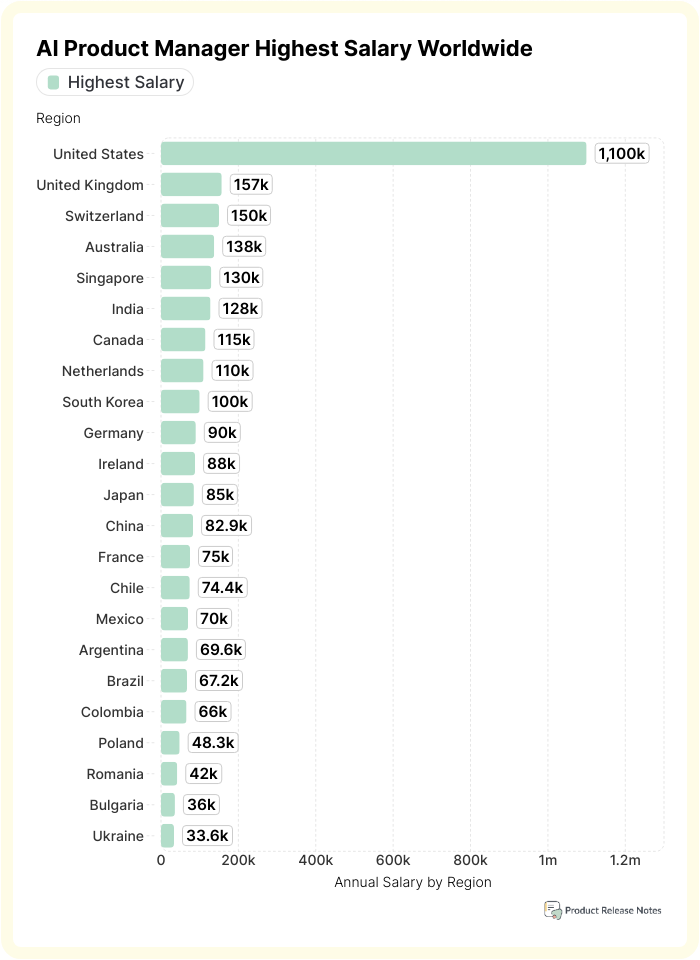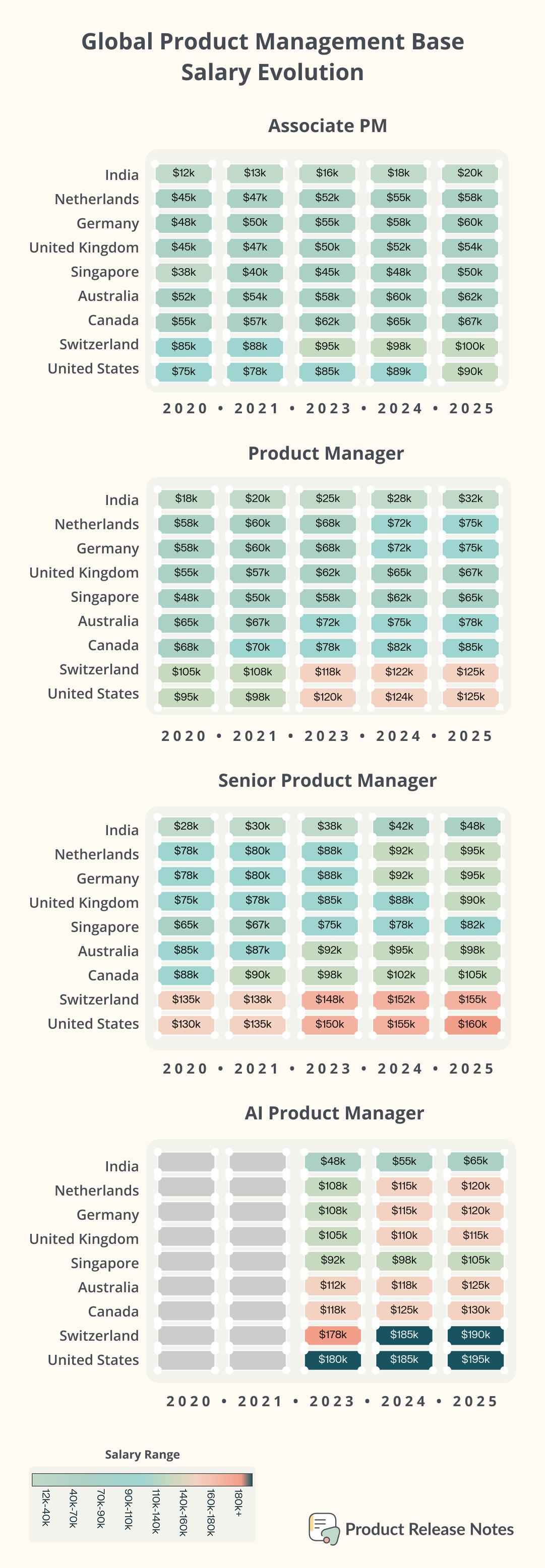How AI Is Changing Global Salary In Product Management
While everyone debates whether AI will replace project managers, a more immediate transformation is already reshaping careers. Here's how you can take advantage of it.
Sources: All salary data verified through Levels.fyi, 6figr.com, Indeed, ZipRecruiter, and company-specific surveys as of August 2025.
I met with a Product Manager last week at an event. She lives in Mexico City, works remotely for a big company in the U.S., and earns $80K managing AI features. While, another PM I know who works for a local Mexican startup doing similar work for $25K. Same skills, same city, wildly different paychecks. This is the new reality of AI product management.
Something fascinating is happening in product management right now.
While everyone's debating whether AI will replace PMs, a more immediate transformation is already reshaping careers: AI has created the most dramatic salary gaps we've ever seen in product management.
The numbers are astonishing. AI Product Managers at OpenAI earn between $759K and $1.1M annually, while traditional PMs in India start at $18K. That's a 61x difference for doing essentially the same job.
But here's what most people miss: this isn't just about cost of living anymore. Remote work has broken the traditional rules, creating opportunities for geographic arbitrage that didn't exist even two years ago.
The Tale of Two Markets 💹
Let me paint you a picture of what's really happening.
PM1 works as an AI Product Manager for OpenAI in San Francisco, earning $929K annually. Meanwhile, PM2 in Bangalore manages traditional product features for a local fintech company, starting at $18K.
Both are brilliant, both understand their domain deeply, both ship products that millions use. The difference? Geography and AI specialization became the ultimate career multipliers.
But hold on because this gets more interesting. Remote work has created a third category: professionals who've cracked the geographic arbitrage code. They earn Silicon Valley salaries while living in Mexico City, Eastern Europe, or Southeast Asia, effectively doubling or tripling their purchasing power.
The data shows distinct tiers emerging:
🥇Tier 1: The AI Premium Markets
OpenAI leads at $929K average, Google follows at $392K, C3.ai at $384K. These represent the absolute top of AI product management compensation.
2️⃣ Tier 2: The Traditional Tech Giants
US AI PMs average $235K, with ZipRecruiter reporting $159K average across the market. Meta pays around $197K for product managers.
3️⃣ Tier 3: The Emerging Markets
India AI PMs now earn ₹40-63 lakhs ($48K-$75K), while traditional roles start at ₹15 lakhs ($18K). Switzerland offers €130K, UK AI roles reach £120K ($157K).
The Gold Rush Of Geographic Interest
A small group of product managers are winning big by playing the geography game strategically.
Remote AI PM roles from US companies now command premium salaries regardless of location. AI startups globally average $144K for product managers, with 70% of these positions filled through hidden job markets rather than public postings.
The sweet spot many professionals have discovered: Work remotely for US or European companies while living in lower-cost regions. A Mexico-based AI PM earning $70,000 enjoys purchasing power equivalent to $200,000 in San Francisco.
Where The Smart Money Is Goes
🌎 North America: Still The Premium Play
The US dominates absolute compensation, but the range is dramatic. While OpenAI pays up to $1.1M, the broader market for AI PMs averages $235K. Traditional tech companies like Meta average $197K, showing the AI premium is real but varies significantly by company.
🌍 Europe: The Work-Life Balance Winner
European markets emphasize sustainability over pure salary maximization. Switzerland leads at $130K average, while UK AI product managers earn £65K-£120K ($85K-$157K).
Here's a key insight: European roles often require stronger emphasis on AI ethics and regulatory knowledge due to frameworks like the EU AI Act. This creates specialization opportunities for compliance-focused PMs.
Salary Ranges by Country:
Switzerland: €115K average (highest in Europe)
UK: €90K average, with London reaching €100K+
Germany: €85K average, strong demand in Berlin and Munich
Netherlands: €84K average, Amsterdam emerging as AI hub
Ireland: €88K average, Dublin attracting tech companies
Key Cities: London, Berlin, Munich, and Amsterdam offer the most opportunities, with strong demand in fintech and enterprise AI.
🌏 Asia-Pacific: The Growth Engine
India presents the most dramatic growth story. AI Product Managers now earn ₹40-63 lakhs ($48K-$75K annually), representing a 250-300% premium over traditional PM roles that start at ₹15 lakhs ($18K).
This isn't just cost arbitrage anymore. Indian AI PMs are commanding real premiums as companies recognize the strategic value of AI expertise.
Key Markets:
Singapore: Emerging as regional AI hub with government-backed initiatives - $50K-$150K USD
Japan: Focus on AI for aging population and manufacturing automation - $30K-$160K USD
South Korea: $2.5 billion government investment in AI infrastructure - $40K-$100K USD
Australia: Strong in AI ethics and financial services AI - $100K-$250K AUD
🌎 Latin America Market
Mexico Salaries:
Average PM Salary: $126,669 MXN monthly ($2,500-$3,680 USD monthly)
Junior Level: $1,750 USD/month
Senior Level: $3,680 USD/month
Remote Mexico: $60,473 MXN ($1,200 USD/month)
Mexico City: Higher end of range due to cost of living. (Now I know! 😅)
LATAM Regional Comparison (Monthly USD):
Argentina: $4,500-$5,800 (mid to senior level)
Brazil: $4,200-$5,600 (mid to senior level)
Colombia: $4,500-$5,500 (mid to senior level)
Chile: $4,750-$6,200 (mid to senior level)
AI-Specific Opportunities: Companies like BlockTXM are actively hiring AI Product Managers for Latin America markets, focusing on AI/ML technologies and AI agents
Why Technical Depth Commands Higher Pay
The data proves AI specialization pays. Comparing verified salaries:
AI-focused companies (OpenAI, C3.ai): $384K-$929K average
General AI PM roles: $159K-$235K average
Traditional PM roles: $30K-$197K range
High-Impact Skills commanding premiums:
Business-focused AI literacy and model performance evaluation
MLOps understanding and AI product lifecycle management
Strategic AI implementation across organizations
The evidence is clear: AI expertise can double or triple your earning potential, even within the same geographic market.
Where To Focus Based On Your Stage
➡︎ If you're starting your career:
India offers the most entry-level opportunities with strong upward mobility, Mexico/LATAM provides excellent remote opportunities for US companies, and Eastern Europe offers growing markets with EU access as well.
➡︎ If you're experienced (5+ years):
The US offers highest absolute compensation, with AI-focused companies paying 3-4x traditional rates, and fastest career growth, Switzerland/UK provide highest European compensation with work-life balance, and Singapore serves as gateway to Asia-Pacific with some tax advantages.
➡︎ If you want remote opportunities:
Target US AI startups offering $144K average with geographic flexibility. LATAM offers best time zone alignment with US companies, Eastern Europe provides EU market access with competitive rates, and India offers the largest pool of English-speaking remote AI talent.
Final Thoughts
Use Geography And AI As Career Strategy
The AI revolution isn't just changing what product managers do, it's changing where they can do it and how much they earn.
The data shows a clear hierarchy:
AI-specialized roles at leading companies: $384K-$929K
General AI PM positions: $144K-$235K
Traditional PM roles with AI exposure: $30K-$197K
Whether you're optimizing for absolute compensation (OpenAI's $1.1M), work-life balance (Switzerland's $150K), or purchasing power (remote US salaries in lower-cost regions), the data provides clear guidance.
But remember: this geographic and skills lottery is temporary. The window of maximum opportunity is open now, but it won't stay that way forever!
The 61x salary gap between OpenAI and traditional Indian PM roles represents a temporary market inefficiency. As AI tools democratize capabilities and more professionals develop these skills, geographic salary differences will narrow.
The geographic implications are profound. Remote work created this arbitrage opportunity, but as supply catches up with demand, only those with genuine AI expertise will command premium salaries regardless of location. Not to mention that many companies are returning to hybrid mode this year.
Make sure you're building both the right skills and the right geographic strategy. The future belongs to AI-native product managers who understand that technical depth, this has become the ultimate differentiator.





Business ought to be more precautious.
Most AI solutions are still in development. Most companies haven’t mastered AI governance.
And large portions of the labor force haven’t mastered AI usage.
It feels like we’re putting the carpet before the horse, designing deployment and talent cuts before designing capacity.
Precarious.
Real interested to see how the push for AI shapes product salaries as companies realize the gap between knowing the business and how the AI products actually work. It seems like at least in the US there's been a rush to downsize - probably a little too quick.